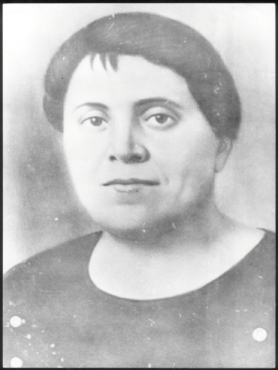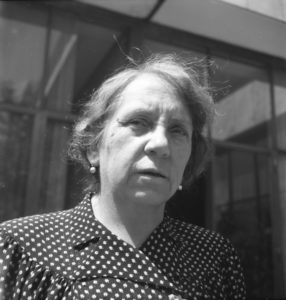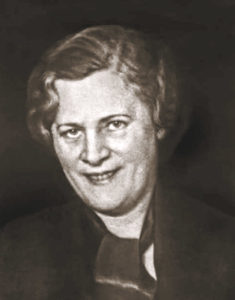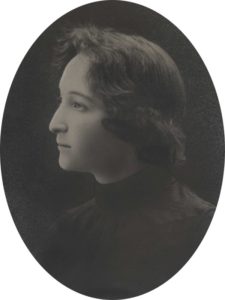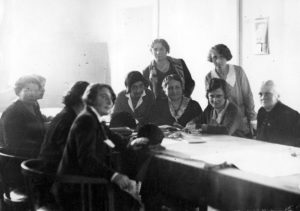by Ivelina Masheva
“Fellow women workers and peasants, wake up and finally start acting”
From “Manifesto to working women around the world”, 10 July 1921
A hundred years ago, in 1921, the Second International Communist Women’s Congress was held in Moscow. Its “Мanifesto to working women around the world” outlined the pressing social issues in the aftermath of the First World War: decreased wages, increased working time, unemployment, tax increase, inflation, higher prices of basic necessities, growing social inequality. The resolution of these problems, the document claimed, required women’s inclusion and active participation in the communist movement. The Manifesto was signed by women delegates from 26 European and Asian countries, including Ana Maimunkova (1878–1925) from Bulgaria. [1]
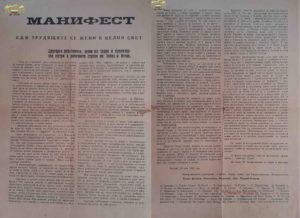
Who was Ana Maimunkova? What do we know about her? Although information on her does exist, its nature and times of publication reflect the vicissitudes of East-European historiography regarding pre-state socialism left activists. In the decades after her death in 1925, Ana Maimunkova’s name and work were of little interest outside the left-wing circles of her former fellow activists. The establishment of the state socialism regime in 1944 changed the situation drastically, making her a heroine overnight. She became part of the new pantheon with schools, streets, and cultural centers named after her. The story of Ana Mai, as was her literary nom de plume, was told in poems, newspaper articles, and books. But the nature of the publications is telling. Only one article in 1953 and a few short encyclopedia entries addressed her life in a scholarly way. All the other publications were of the poetry, fiction, journalism, and popular science genre. In short, the regime was interested in heroizing her and especially her martyr death, rather than analyzing her life and legacy. After 1989, the interest stopped altogether.
Ana Maimunkova was born on 26 June 1878 in Haskovo as one of the nine children of a middle-class family.[2] In 1893 she enrolled as a high school student in the State Girls School in Plovdiv where her teacher was Vela Blagoeva – a prominent feminist and socialist activist.[3] According to her sister’s memoirs, it was under Blagoeva’s and her husband’s [4] influence that Maimunkova formed her Marxist views. These first ties with the socialist movement were also a key factor for her orientation towards the communist or the “narrow” fraction of the social-democratic party.
In 1895, Ana Maimunkova returned to her home town and began working as an elementary school teacher. She was part of a small but active socialist group in Haskovo, whose ideas obviously scandalized the conservative school administration and resulted in her dismissal as a teacher in 1900. In the next 20 years, she was hired and subsequently fired numerous times forcing her to repeatedly leave her home town to take teaching positions in various towns and villages in South-East Bulgaria.[5] Two documents are preserved in the State Archive in Haskovo, stating the clearly political grounds for her dismissals – „for open rebellion against public order and religion“ and for „overt partisanship”.[6] According to her sister’s (unfortunately rather brief) memoirs about her, during her unemployment periods in 1906 and again in 1908 Maimunkova went to Belgium in order to further her education and on party business.
In the 1900s and 1910s, Ana Maimunkova also took an active role in the trade union movement. In June 1906 she was the only female delegate in the First Regular Congress of the Social-democratic Teachers’ Organization[7]. In the next years, she was a contributor to its organ Uchitelska iskra [Teachers’ Spark] and continued to be active in the trade union until the early 1920s. In 1919-1920 she was also involved in a tobacco strike and in a railway strike in Haskovo. Maimunkova was arrested following her speech at a strikers’ public assembly and participation in the subsequent street rally.[8]
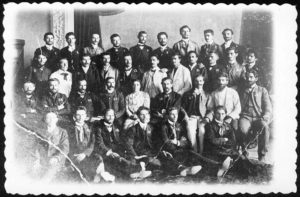
In 1919 Maimunkova participated in the Third Conference of the Bulgarian Communist Women Organization and was elected as a member of its Central Commission. During the conference, it was decided that the organization would start publishing its own newspaper called Ravenstvo [Equality], which Maimunkova – now living in Sofia – edited from 1920 to its prohibition by the government in 1923. The paper was extremely popular, reaching in March 1922 a circulation of 15 000. In 1924 together with a fellow communist activist Tina Kirkova (1872-1947), she started publishing another paper dedicated to the problems of working women – Rabotnichka [Woman Worker]. Her newspaper articles were centered on communist ideas, women’s rights, and social justice with titles such as “Women’s Political Rights”, “Muslim Women and Communism”, “How to Prepare Women for the Forthcoming Struggle”. [9]
As a prominent activist of the Bulgarian communist party, in 1921 she was sent as a delegate to the Second International Communist Women’s Congress in Moscow, hence she ended up among the signatories of the Manifesto quoted above. Maimunkova presented a report on the state of the women’s communist movement in Bulgaria, which prompted Clara Zetkin to single out Bulgarian activists, together with those of Germany and Russia, as a model and an example for other communist women. Among other decisions to promote party work among women, the congress decided to execute two mass campaigns during the next year – organizing an annual International Women’s Day on 8 March and series of fund-raising initiatives in response to the famine in the USRR. [10]
In the next year, Maimunkova worked on following the directives of the 1921 congress. The celebration of International Women’s Day on 8 March 1922 turned into a huge success. With regard to organizing the emergency aid to the starving soviet regions, Maimunkova’s journal articles reveal both her dedication to the cause but also her tunnel vision and uncritical adherence to the party line. Even though information on the extent of the famine and its causes were circulating in Bulgarian newspapers, Maimunkova discarded uncritically all insinuations of the soviet government’s responsibility for the destitute situation of its peasantry. She in turn accused “the bourgeoisie” of using a natural disaster to discredit the October Revolution and its achievements. Her positions glorifying the soviet model were typical for contemporary Bulgarian communists though, as by that time the party had already firmly realigned along Bolshevik lines.[11]
In June 1923 a coup d’état was executed against the left agrarian government of Alexander Stamboliiski. Communists opposed the new regime and were in turn persecuted by it. In 1923 Maimunkova barely escaped arrest by hiding with her sister. During these turbulent times, she took the precaution to destroy her personal archive, thus depriving contemporary researchers of vital self-authored sources on her life story. Communist opposition to the new regime resulted in a vicious circle of ever-escalating violence culminating in April 1925 with communists’ bombing of the St. Nedelia Cathedral in Sofia. During the persecutions that followed, Ana Maimunkova was arrested together with other left-wing intellectuals and “disappeared” in May 1925.[12] During the state socialism period, extensive efforts were made to collect evidence on the 1923-1925 persecutions which confirmed Maimunkova’s brutal treatment and subsequent death at the hands of police. In the 1970s “Po diriata na bezledno izcheznalite” [In Search of the Missing] popularized the investigation and its results in a book and subsequently in a movie.[13]
[1] Durzhaven arkhiv – Ruse [State Archive – Ruse], ChP 371, l.1
[2] Todorova Ts., Ana Maimunkova, Sofia: Otechestven front, 1965
[3] For more information on Vela Blagoeva see: de Haan, F., Daskalova, K., and Lutfi, A. eds. A Biographical Dictionary of Women’s Movements and Feminisms. Central, Eastern, and South Eastern Europe, 19th – 20th Centuries. Budapest and New York: CEU Press, 2006, pp. 62-65.
[4] Dimitur Blagoev was the founder (in 1891) and first leader of the Bulgarian Social-democratic party. After the 1903 split he headed its communist wing – the “tesni” [narrow] socialists.
[5] Maimunkova Angelova, V., Sestra mi Ana [My sister Ana], Svetli Obrazi [Bright Figures], 20 May 1965.
[6] Durzhaven Arkhiv – Haskovo [State Archive – Haskovo], ChP 315K, l. 26.
[7] The trade union was composed of left-wing teachers who had left the more moderate Bulgarian Teachers’ Union the previous year.
[8] Maimunkova Angelova, Vesa, op. cit.; Todorova Ts., Ana Maimunkova, Sofia: Otechestven front, 1965.
[9] Vodenicharova, Z., Popova, N., Revoliutsionnoto zhensko dvizhenie v Bulgaria [Revolutionary Women Movement in Bulgaria]. Sofia: Otechestven front, 1972, pp. 95-107.
[10] Riddell, John, ed. 2015. To the Masses: Proceedings of the Third Congress of the Communist International, 1921. Leiden & Boston: Brill, pp. 41, 782, 791
[11] Vodenicharova, Z., Popova, N., op. cit, pp. 107-112.
[12] Maimunkova Angelova, V., op. cit.
[13] Hristozov, N., Po diriata na bezsledno izcheznalite [In Search of the Missing], Sofia: Partizdat, 1973; Po diriata na bezsledno izcheznalite [In Search of the Missing], dir. M. Nikolov, Bulgaria, 1979. The film is available on: https://www.youtube.com/watch?v=j_cdHQJXMfc
Illustrations:
1. Ana Maimunkova, Durzhaven arkhiv – Haskovo [State Archive – Haskovo], ChP 235K
2. “Manifesto to working women around the world”, 10 July 1921; Durzhaven arkhiv – Ruse [State Archive – Ruse], ChP 371, l.1
3. Participants in the First Regular Congress of the Social-democratic Teachers’ Organization, Sofia (9-12 July 1906); Durzhaven arkhiv – Haskovo [State Archive – Haskovo], ChP 706К

